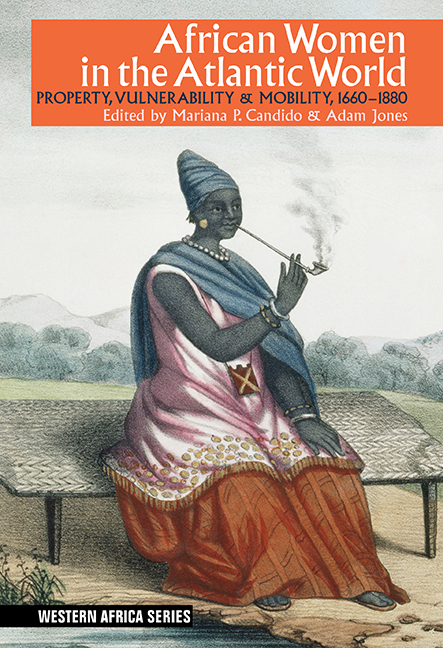Book contents
- Frontmatter
- Contents
- Acknowledgements
- List of Illustrations
- Contributors
- Map 1 Western Africa
- Introduction
- Part One Property
- Part Two Vulnerability
- 5 Prostitution, Polyandry or Rape? On the Ambiguity of European Sources for the West African Coast, 1660–1860
- 6 Parrying Palavers Coastal Akan Women & the Search for Security in the Eighteenth Century 109
- 7 To be Female & Free Mapping Mobility & Emancipation in Lagos, Badagry & Abẹokuta 1853–1865
- 8 Gendered Authority, Gendered Violence Family, Household & Identity in the Life & Death of a Brazilian Freed Woman in Lagos
- Part Three Mobility
- Bibliography
- Index
6 - Parrying Palavers Coastal Akan Women & the Search for Security in the Eighteenth Century 109
from Part Two - Vulnerability
Published online by Cambridge University Press: 26 March 2019
- Frontmatter
- Contents
- Acknowledgements
- List of Illustrations
- Contributors
- Map 1 Western Africa
- Introduction
- Part One Property
- Part Two Vulnerability
- 5 Prostitution, Polyandry or Rape? On the Ambiguity of European Sources for the West African Coast, 1660–1860
- 6 Parrying Palavers Coastal Akan Women & the Search for Security in the Eighteenth Century 109
- 7 To be Female & Free Mapping Mobility & Emancipation in Lagos, Badagry & Abẹokuta 1853–1865
- 8 Gendered Authority, Gendered Violence Family, Household & Identity in the Life & Death of a Brazilian Freed Woman in Lagos
- Part Three Mobility
- Bibliography
- Index
Summary
On Tuesday, 22 July 1788, Martin Watts, commander of the British slavetrading fort at Anomabo, sent a letter appealing to his superior, Governor Norris, at Cape Coast Castle: ‘I am heartbroken and do not know what to do.’ The principal caboceer (headman), Amonu Kuma, ‘one of the most powerful men in all the Fante states’, was pressing Watts to ‘hand over’ his locally born wife and children. Amonu had given him an ultimatum: ‘Next Saturday will be the day I have to hand her over, and will be a spectator to the murdering of my wife and children, sacrificed to slavery.’
While a crowd of Amonu's adherents showed bravado in front of the fort gate, reminding Watts that their master was not joking, Watts attempted to gain time. As some of his wife's family happened to be ‘Dutch subjects’, originating from nearby Mouri, and ‘she herself, had lived for several years under Dutch rule’, his wife felt entitled to appeal to ‘His lordship the General of Elmina’. Compared with Norris, Watts’ British superior, she deemed the director-general of the Dutch West India Company, stationed at Elmina Castle, better able to pass an impartial judgement on her case.
Therefore, Watts placed his hope in the hands of both governors so that they, with the Terre Grandes (principal headmen or elders) of Cape Coast, could act ‘to bring this palaver to an end’. His wife had convinced him that only a joint effort in diplomacy at the very top level could save their children and herself.
Was Madam Watts, who was of Eurafrican descent and married to the commander of a British trade fort according to the ‘customs of the country’, really in danger of being reduced to slavery with her children, or did her husband – he even spoke of ‘murder’ – dramatise the precariousness of her situation? Although he appeared to be panic-stricken by Amonu Kumu's intimidating conduct, she apparently managed to keep a cool head. It was she who, having been born and raised in the cosmopolitan coastal environment, came up with the idea of summoning the help of the senior Dutch authority.
Like all peoples belonging to the myriad of African Atlantic societies in the eighteenth century, the coastal Akan had to cope with disruptive effects derived from the intensification of the trade in enslaved human beings.
- Type
- Chapter
- Information
- African Women in the Atlantic WorldProperty, Vulnerability & Mobility, 1660–1880, pp. 109 - 130Publisher: Boydell & BrewerPrint publication year: 2019



